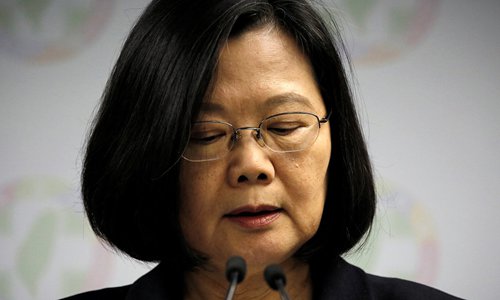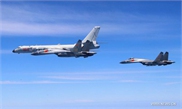Risks seen in future relations across the Taiwan Strait but overall situation controllable: expert

Tsai Ing-wen Photo:VCG
This year, events affecting relations across the Taiwan Strait have popped up one after another. There were the reelection of Taiwan leader Tsai Ing-wen, the removal of Kaohsiung Mayor Han Kuo-yu, politicized and highly inappropriate interactions between the US and the island, the People's Liberation Army's military exercises in and around the straits, and the unfortunate impact of the COVID-19 Pandemic.
People on both sides of the strait and around the world are wondering what the trends of cross-Straits relations will be like.
In an exclusive interview, Global Times reporters (GT) discussed the future of cross-strait relations with Wang Zaixi (Wang), former deputy director of the Association for Relations Across the Taiwan Strait of the State Council and Vice President of National Taiwan Studies Association.
GT: How do you compare Tsai Ing-wen's "inaugural speech" on May 20 with the one she gave after her election four years ago?
Wang: Although the cross-Straits relations part in Tsai's May 20 speech was less detailed with an evasive attitude compared to her speech four years ago, there were still some points in the speech that should put us on high alert.
First, Tsai said she would deal with cross-Straits relations following Taiwan region's current "constitution" and the "Act Governing Relations between the People of the Taiwan Area and the Mainland Area," but she also said a "constitutional amendment committee," would be established implying that the "constitution" can be revised at any time. In that case, Tsai's promise to follow the "constitution" would be nonsense.
Second, Tsai pretty much avoided the 1992 Consensus, only reiterating words about "peace, reciprocity, democracy and dialogue" in her speech. The latter two words clear show her attempt to turn cross-Straits relations into a discussion between two countries.
Third, Tsai flagrantly called the island "Republic of China, Taiwan" instead of "Republic of China," which suggests an intent to create an independent Taiwan and legally separate it from the mainland, and to realize her goal of "Taiwanization" - that is, "de-sinicization" of the island.
GT: KMT's report on the reasons for its election defeat released in January had many different reactions inside the Blue Camp. How do you view the KMT report, and the "four pillars" mentioned in the report?
Wang: The KMT report, which has some serious problems, has been questioned inside the KMT and the Blue Camp. Even some KMT seniors expressed different opinions on the report. I believe there are three major questions. First, it failed to find the real reason for its two consecutive electoral failures, which is rooted in the disunity inside the party. There were some twists in choosing a candidate before Han was chosen. And that decision wasn't unanimously supported inside the KMT, which led to Han fighting the campaign on his own. Han was attacked more from his Party than the DDP.
After Tsai Ing-wen beat Lai Ching-te to be the DDP candidate, there were not dissenting voices inside of the DDP.
It's absurd for KMT to blame its failure on the 1992 Consensus.
Second, the 1992 Consensus can be updated but cannot be abandoned. Ma Ying-jeou opened a new horizon in Cross-Straits exchanges, and achieved peaceful development and established the direct mail, transport and trade links during his eight-year rule. The DPP still cannot give up the bonus from the signing of Cross-Straits Economic Cooperation Framework Agreement. It is ironic that the KMT chose not to refute this when Tsai attacked the 1992 Consensus as a "one country, two systems."
Third, the "four pillars" is wrong, which essentially is Lee Teng-hui's "special state-to-state relations." The "Four pillars" runs counter to the 1992 Consensus. There's no doubt that vote was important. However, abandoning its political stance just to win more votes is not worthwhile for KMT.
GT: Some people think the KMT won't recover from this series of hits and won't regain power for a long time. What is your opinion?
Wang: That's not necessarily true. The key is for the KMT to transform itself - can it find the right position and grasp the opportunity to regain the office the next time.
As the DPP has been long in power, corruption, "black gold" politics and power division will spread. Most voters won't stand for a one-horse race, and the US also dislikes a party holding power for a long time. Moreover, the DPP is a political party that is "good at getting elected but bad at ruling." It believes that as long as the DPP destroys opposition parties, it can stay in the office as long as it wants. But that's impossible.
Han was removed, and there will be alternatives.
The DPP has its advantages during elections, but it also has disadvantages: can't deal with the cross-Straits relations, the Taiwan economy nor international society.
The KMT has a history of 126 years with rich experience and talent. It now needs to solve four problems: internal unification, maintaining the young generation, finding its development direction and right position, and change its image of "bigwigs" to one that is more acceptable to the public. If the KMT follows the DPP, it will not have a future.
GT: How do you see the impact of the pandemic on the cross-Straits relations this year? What is your opinion on DPP's so-called "epidemic diplomacy"?
Wang: The pandemic has caused a huge impact on cross-Straits relations as Washington and Taipei have had frequent interactions and "tacit cooperation" during the virus outbreak. The Tsai administration cooperated with Washington in blaming the mainland for the pandemic, saying COVID-19 originated in Wuhan. Even now some Taiwan-based media still call the COVID-19 disease the "Wuhan pneumonia," which clearly shows their [ill will].
In the pandemic, Washington not only mobilized US companies to leave the Chinese mainland but also forced Taiwan's high-tech enterprises that had invested in the mainland, such as Taiwan Semiconductor Manufacturing TSMC, to leave the mainland for the US. Meanwhile, Washington sent a message congratulating Tsai on the commencement of second term in office in the name of US Secretary of State Mike Pompeo, and announced the sale of arms and equipment to Taipei, which emboldened the separatists on the island.
As a result, Tsai, who thinks she enjoys the support of the Taiwan pubic and Washington, has taken a tougher stance on cross-Straits relations this year since the pandemic has broken out in the mainland. Tsai has set stricter restrictions on cross-Straits exchanges, and has taken a more adamant approach to "Taiwan independence." It is abundantly clear that Tsai is "seeking independence with the pandemic" and using the virus' spread to prevent cross-Straits exchanges.
I think Taipei's "epidemic diplomacy", which is costing the DPP authority a lot of [time and money], has had little effect.
Gloating over the virus outbreak in Wuhan earlier this year, the Tsai authority announced a ban on the export of masks and other virus-fighting supplies to the mainland, when the mainland was at the height of the epidemic. Nonetheless, after the virus spread globally, Tsai deployed her so-called "mask diplomacy" claiming in April the island would donate 10 million masks to others, and to provide weekly 100,000 masks to the US.
With Washington's support, Tsai also attempted to squeeze into the WHO by publicizing the island's "virus-fighting experience" and its "contribution to the international community" during the pandemic. This attempt later ended in failure, showing the solid foundation of the one-China principle in the international community.
GT: PLA fighter jets have been flying near the island of Taiwan. In March it conducted nighttime exercises for the first time and the sorties became quite frequent in June. How do you read the actions of the PLA?
Wang: PLA fighter jets flying near Taiwan are normal. The meaning is to declare the sovereignty of China over Taiwan, to deter "Taiwan independence" forces, and to conduct routine military training. The frequency is related to the situation on the island and the environment nearby.
GT: What do you expect cross-Straits relations will be like over the next four years?
Wang: It will be tough and complex with more variables and risks, but the overall situation is controllable.


